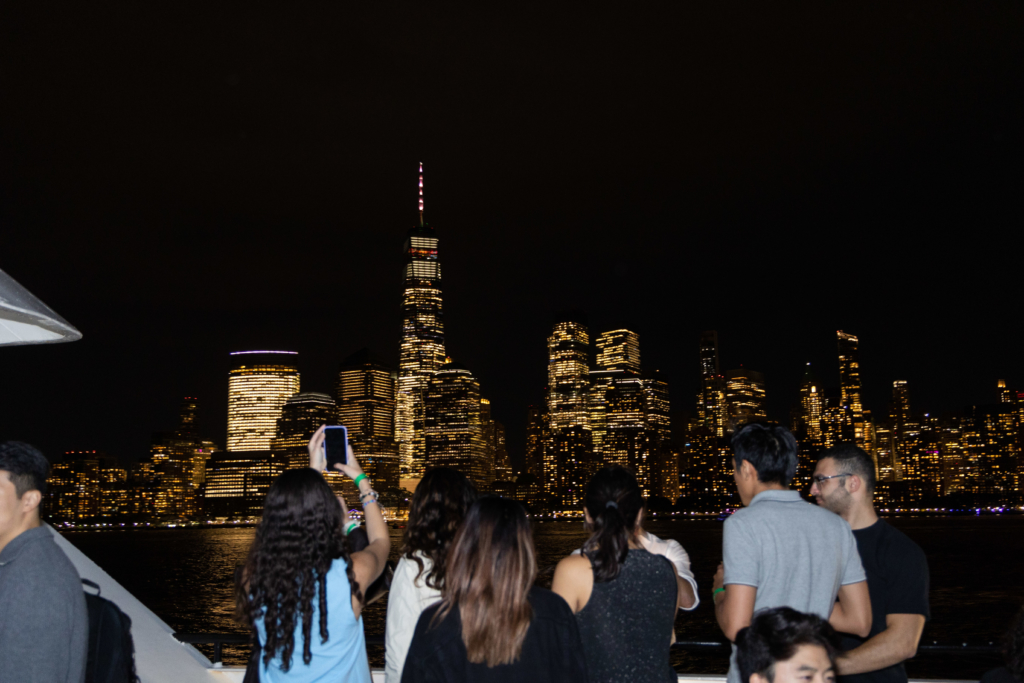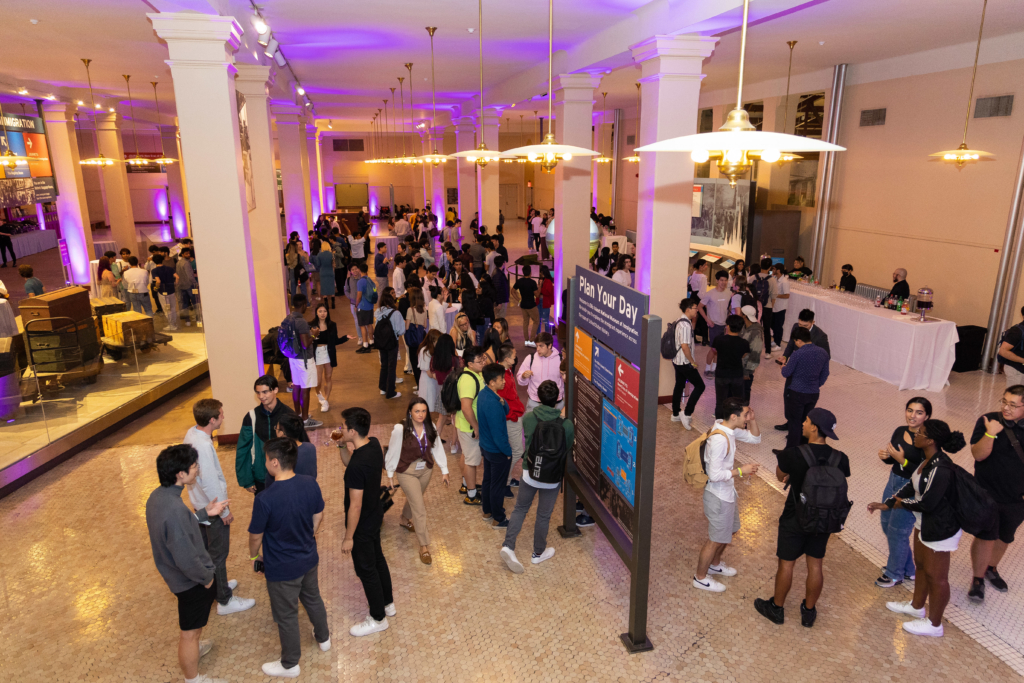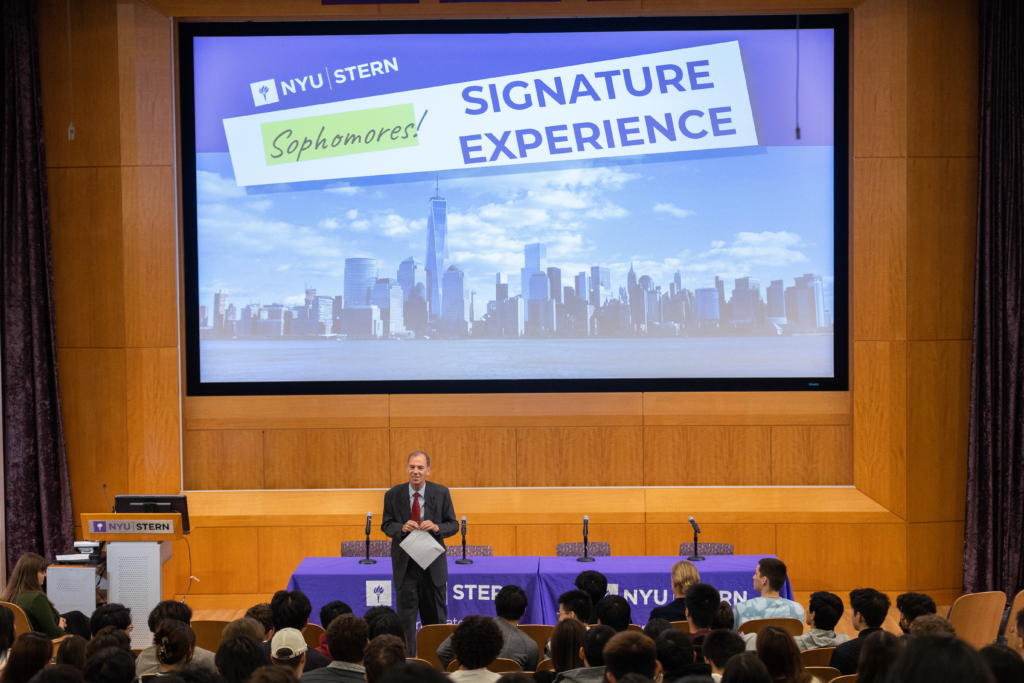
Night views from the deck of the Stern Signature Experience harbor cruise boat gives sophomores a new perspective. Courtesy photo
Well, let’s begin with the capstone course. In retiring ISP, what does that look like now for Stern undergrads?
We wanted to imagine a capstone as if we were building it from scratch. So, we put the new capstone in senior year because we want students to be able to synthesize, integrate, and apply what they’ve learned over their four years.
We also wanted to exploit all the locational advantages of New York: A ton of our alums are here, and we have this amazing network of organizations, companies, firms we can work with. We doubled-down on experiential.
Basically, what we envision, and what is going to be introduced for the class of 2024, will be a new capstone course with multiple sections.
You can think of it as consulting to that organization, but that organization could be in any number of industries. My area is asset management, so it could be BlackRock, but it could also be a nonprofit. We have a very strong relationship with the UN and we do a lot of social impact work within New York City.
There will be an issue that they’re trying to address, and then the students in that section are basically working on that problem during the course of the semester, which is experiential. There will be multiple flavors. If you want to do something with a nonprofit that’s working on food security, we have a section doing that. Want to do classical strategy consulting for a consumer products company? Brand innovation? We have a section doing that. The idea is that over the course of senior year, we’ll offer maybe 20 sections of this course, and each section will be linked to a different New York City organization, and then all students will have this beautiful capstone experience.
What kind of feedback have you gotten from industry as you’ve started establishing these capstone sections?
We are fortunate, because, first, we’ve already been doing a certain amount of experiential work at the undergrad level. The Design Sprint is a very nice example that we brought in for startups. So we actually have an experiential learning group that is already developing these connections, and there’s already a lot of excitement. This is, in some sense, just building off that excitement, while hopefully also building new connections as well.

Ellis Island plays host to Stern juniors reconnecting at the start of the academic year. Courtesy photo
And these capstone sections would change from year to year, depending on the issues an organization is facing?
Yes, the companies and the problems can change. Sometimes the organization stays the same and the problem changes semester to semester. Sometimes, there’s a new organization with a very interesting new project.
It will evolve over time. That’s the beautiful thing because it’s not sort of tied to a specific curriculum, it’s really tied to the question, and that’s a really important part of experiential learning.
This course has to have meaningful academic content which means the problem has to be aligned with the expertise of the faculty member who is teaching that section. It’s not that we just send out groups to consult. The vision is that there’s a faculty member, there’s a company that’s coming up with a question or problem that is going to allow the students to really exercise those problem-solving academic muscles, and for us to provide a framework for them to actually think about it.
How do you see this as being different from other experiential learning programs or courses at other undergraduate business programs?
Now, a lot of people are talking about experiential learning, and that’s a great thing. We think experiential learning is important, especially in an undergraduate business program because of its inherently applied nature. I don’t think the idea is necessarily new, I think it’s more distinguished in the way we execute.
The big advantage we have is the fact that we’re sitting in New York with our network; The range and depth of opportunities that we can offer is just a little bit different than what can be offered perhaps elsewhere. We’re talking to companies that are a 15-minute subway ride away. It’s also the scope of the program. All of our BS in Business students will take this course, so about 600 students per year.
Every Stern undergraduate will also have to fulfill a global program requirement, starting for the class of 2027. What does that look like?
One of the things that ISP did was create this authentic global experience. We basically asked how do we do this better? The answer is it’s about choice and flexibility.
There will be three main ways to fulfill the new global program requirement: One is to study a semester away at an NYU global site. This is, again, one of our advantages: We have 14 sites outside of New York where students can go — NYU Paris, NYU Prague, NYU Buenos Aires, and so on.

Vice dean Robert Whitelaw introduces the sophomore Stern Signature Experience theme of ‘Perspective’ prior to embarking on their harbor cruise. Courtesy photo
A second way would be to spend a semester at one of our IBEX (International Business Exchange Program) partners. We have 17 partners across the world including Bocconi University in Milan, PKU (Peking University) in Beijing, and many others.
The third piece, which is the new piece, is this program that we call Stern Around the World. Essentially, it is a portfolio of courses that have a travel immersion component to them. So ISP, except it’s not a single course, but this whole portfolio of courses. I’ll give you a couple of examples: We have a sustainability consulting course that has a trip to Costa Rica. In Ghana, we have a social entrepreneurship course which is taught during the spring semester and then, over spring break, the students go to Ghana. We have adopted a village there that we’ve been working with for more than a decade. For this course, students have actually helped them develop a business producing fabric, and they are actually now selling it to this little dressmaker in Brooklyn who has a store in DUMBO.
Those courses have already existed, but we’ve actually boosted that portfolio to six courses this year. They include trips to the Netherlands, Singapore, France, and actually domestic trips as well because we have a lot of international students. We’re going to build it even further next year.
The beauty is there’s just so much more choice and flexibility. ISP was in the Spring semester junior year only. These courses, you can take at any time. Again, there are multiple flavors that allow students to better match the course to their interests. We talk a lot about intercultural competence in an increasingly globalized world. Even if you are in the U.S., you’re working with people from all different backgrounds. To be able to relate to people, to be able to understand people who come from different cultures, is part of each of these courses.
We also introduced a whole new financial aid package, because we do not want financial need to stand in a student’s way of satisfying this global requirement in the way that is best for them. We’ve always had financial aid for study away, but now we have a new scholarship program where if you have financial need, we’ll cover the course fee, and we’ll cover the travel costs.
And finally, what about community building? How will Stern replace these kinds of cohort connections when 200 juniors travel to a country together as they did with ISP?
ISP was a great community builder for sure, and we didn’t want to lose that.
For a long time, during orientation, we’ve been sending the whole first year class to the U.S. Open in Flushing because the U.S. Open has always coincided with orientation because it is played the two weeks around Labor Day. It’s been our sort of welcome to New York event, and it’s great for community building.
We thought, if this is so great for first years, why aren’t we doing this for sophomores, juniors, and seniors? So we added what we call this new Signature Experience Series, and we ran it for the very first time in September. Sophomores went on a harbor cruise. The juniors rented Ellis Island, and the seniors rented the Intrepid, an aircraft carrier that houses the Intrepid Sea, Air & Space Museum.
We also have class specific programming built in. For example, for the sophomores, we integrated a program we call Recruitment Ready. Sophomore year, for better or worse, is the year when recruiting starts seriously. We just want them to understand what this means and what the timelines are for different industries. So it’s a chance for us to bring the class together but also give them a set of information that’s really useful for them for that coming year.
We hope that this suite of three innovations in particular is going to create a better, more cohesive experience for our students. More choice, more flexibility, that’s what we want to offer.
DON’T MISS: NEW DEGREE IMMERSES STUDENTS IN REAL-WORLD CHALLENGES and ‘EXCELLENCE AT SCALE’: PURDUE’S BIG PLANS FOR BUSINESS EDUCATION











Questions about this article? Email us or leave a comment below.